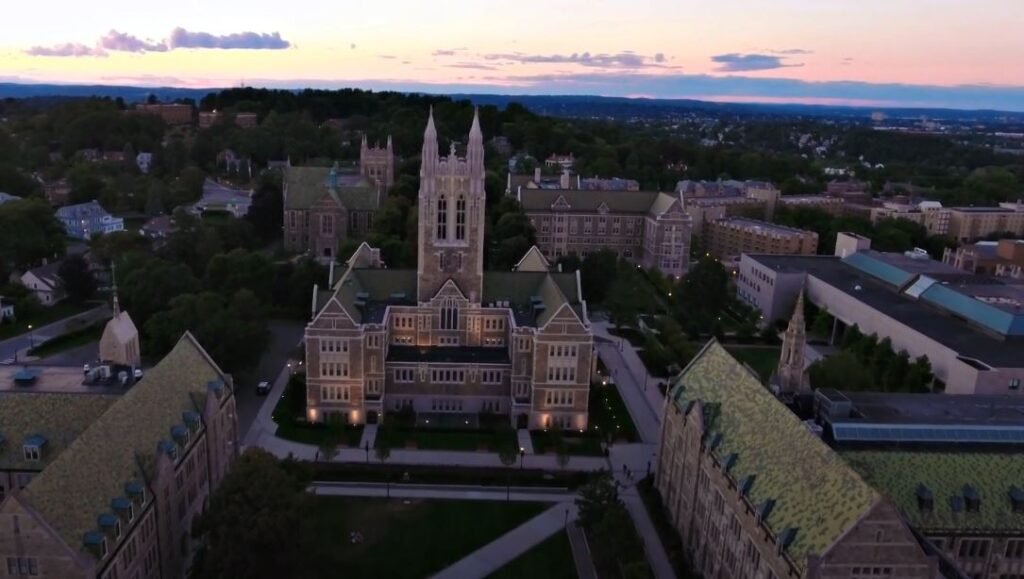
Boston College’s national reputation has significantly improved over the last few years, a result of an institutional strategy that has been both purposeful and incredibly successful. The university moved up two spots from the previous year to #37 among National Universities in the 2025 U.S. News & World Report rankings. This ranking clearly shows confidence in BC’s academic development, placing it on par with Tufts and ahead of a number of regional rivals, such as Boston University (#41), Northeastern (#54), and Brandeis (#63).
This development is a direct result of Boston College’s efforts to reinvent its academic profile. The university achieved a #6 ranking in Best Undergraduate Teaching, a category that gauges how committed academic institutions are to fostering their students in addition to faculty credentials. The mentoring style of BC’s faculty has been widely commended; they frequently combine teaching and research in ways that make coursework feel especially pertinent. Students talk about a culture in which instructors challenge, mentor, and inspire students in addition to teaching.
Key Stats on Boston College Rankings and Academic Profile
| Attribute | Value |
|---|---|
| University Name | Boston College |
| Established | 1863 |
| Location | Chestnut Hill, Massachusetts |
| Type | Private Jesuit Research University |
| U.S. News National Rank (2025) | #37 (Tied with Tufts University) |
| Best Undergraduate Teaching | #6 |
| Best Global University Rank | #518 |
| QS World University Ranking (2026) | #526 |
| Notable Program Ranks | #9 Nursing, #7 Finance, #10 Marketing |
| Acceptance Rate | 16% |
| Undergraduate Enrollment | 9,575 |
| Student-Faculty Ratio | 10:1 |
| Four-Year Graduation Rate | 88% |
| Median Salary (6 Years After Grad) | $85,717 |
| Official Website | www.bc.edu |
Boston College has placed remarkably competitively in programs with real economic weight. In terms of Best Undergraduate Business Programs, its Carroll School of Management has been rapidly rising and is currently ranked 27th. Its specialization rankings—#7 in finance, #9 in business analytics, and #10 in marketing and entrepreneurship—are even more remarkable. These rankings are industry signals rather than merely statistical boasts. Boston College has become a more sought-after school for top-performing interns and recent graduates, according to recruiters from companies like Deloitte, BlackRock, and Bain & Company.
The Connell School of Nursing, which climbed to #9 nationally, is another shining example. BC’s capacity to train future frontline professionals has proven especially advantageous in light of the country’s nursing shortage and healthcare reform. Students entering one of the most challenging fields of public service find great resonance in the program’s blend of academic excellence and ethical foundation.
The global ranking of Boston College is equally impressive. It continues to close gaps in research productivity and international engagement, despite ranking #518 in the U.S. News Best Global Universities and #526 in the QS World University Rankings. Based on faculty output and citation data, its research impact is continuously increasing. For example, BC is ranked #100 in the world in Economics and Business, partly because of faculty members who work across continents and publish in prestigious journals. The transition from regional strength to global presence is highlighted by this expanding influence.
When looking at the student outcomes, Boston College’s value proposition becomes even more evident. The return on investment is remarkably favorable, with top-tier starting salaries in fields like finance ($135,373) and computer science ($155,305) and a median salary of $85,717 six years after graduation. The fact that BC offers need-blind admissions and financial aid packages that average more than $56,000 makes it clear that the university is surprisingly affordable for top-achieving students from a range of socioeconomic backgrounds.
The reputation of Boston College is significantly influenced by student involvement. The university’s investment in student development outside of the lecture hall is reflected in its rankings of #9 in First-Year Experience and #18 in Study Abroad. In order to create graduates who are highly adaptive, first-year students frequently take part in service learning, interdisciplinary seminars, and global learning opportunities. BC provides students with an academic passport that exposes them to real-world issues and cultures through strategic partnerships with institutions in South Africa, Spain, and Ireland.
The softer cultural touchstones are just as significant, even though rankings frequently measure hard data. The Jesuit tradition has a strong influence on Boston College, promoting an all-encompassing, morally sound, and purpose-driven educational approach. In addition to the technical and analytical skills taught in the classroom, students are regularly involved in community service, ethical discussions, and introspection. These principles are not merely customary; they are forming a new generation of leaders who are taught to balance purpose and profit.
Boston College has also become a leader in cutting-edge education in recent years. The university’s efforts in curriculum redesign, faculty development, and research infrastructure were recognized when it was named #19 in the “Most Innovative Schools” category. Academic flexibility and societal relevance have significantly increased as a result of the creation of new interdisciplinary majors, the growth of online course offerings, and funding for research with a sustainability focus.
Boston College is doing especially well in comparison to other private research institutions. At a time when methodology changes have tended to favor large state universities with high Pell Grant populations, it has risen in rankings. BC has remained stable and even improved in spite of these difficulties, which is evidence of its tenacity and progressive policies. Boston College consistently outperforms expectations, even though changes in metrics have rearranged rankings overall. From 2011 to 2018, its average national ranking was #31.
The momentum is arguably the most exciting aspect. Boston College has made substantial improvements to its campus, academic programs, and research funding during the last ten years. The school is set to take another step forward with plans to build new science centers, increase student housing, and hire internationally renowned faculty. In the upcoming years, a campus that is more and more geared toward inclusivity, innovation, and collaboration will probably benefit both teachers and students.
Alumni frequently mention more than just classroom instruction when they think back on their time at BC. Boston College fosters an emotionally vibrant and incredibly cohesive community, whether it is through participation in the annual Red Bandana Run in honor of 9/11 hero Welles Crowther or cheering at Alumni Stadium on a cool fall Saturday. Rankings only start to capture that unique combination of academic rigor and a sense of belonging.

